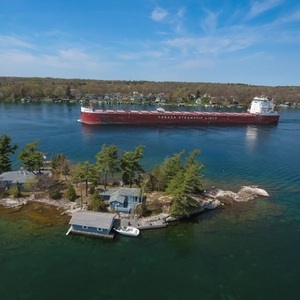CSL successfully completes world's largest B100 biofuel tests

December 14, 2021
BY CSL
In late November 2021, CSL successfully completed the world’s longest-running trials of B100 biodiesel on marine engines, accumulating nearly 30,000 running hours. Conducted on half of CSL’s Canadian fleet, the tests resulted in a 23 percent total fleet life cycle reduction of CO2 as compared to marine gas oil (MGO).
During the trials, conducted in partnership with Canada Clean Fuels and with the collaboration of Sterling Fuels, 14,000 metric tons of MGO, a fossil fuel, was substituted for 100 percent bio-content second-generation biofuel, requiring no modification to existing ship equipment.
“Reducing the carbon footprint of our fleet is a strategic imperative at CSL and these trials clearly demonstrate the viability of biodiesel as a practical and effective option to drastically reduce our GHG emissions,” said Louis Martel, CSL’s president and CEO.
Advertisement
“Our test results confirm the potential of biodiesel as a realistic and immediate alternative to fossil fuel that holds great potential to support the decarbonization of the marine transportation sector in Canada and throughout the world.
We encourage the International Marine Organization, the Government of Canada and governments around the world to recognize the credible impact of biofuels as an interim solution in reducing emissions, and to support and implement a cost-competitive framework that promotes its use and secures supply.”
Advertisement
CSL’s biofuel trials were conducted on eight ships over a period of six months under a Transport Canada testing protocol. The B100 biodiesel was tested on main and auxiliary engines and required no modification to existing equipment. Sourced in North America, the biofuel used was produced entirely from waste plant material. Emissions reductions were calculated through the Canadian government life cycle emission tool GHGenius.
“Biofuel is one of many decarbonization strategies we are exploring at CSL,” added Martel. “As we closely monitor the development of alternative fuels and continue to invest in R&D and innovative digital solutions, we are confident the use of biodiesel can speed up decarbonization in the marine transportation sector by offering immediate and significant carbon reductions.”
Related Stories
The USDA’s National Agricultural Statistics Service on June 30 released its annual Acreage report, estimating that 83.4 million acres of soybeans have been planted in the U.S. this year, down 4% when compared to 2024.
SAF Magazine and the Commercial Aviation Alternative Fuels Initiative announced the preliminary agenda for the North American SAF Conference and Expo, being held Sept. 22-24 at the Minneapolis Convention Center in Minneapolis, Minnesota.
Saipem has been awarded an EPC contract by Enilive for the expansion of the company’s biorefinery in Porto Marghera, near Venice. The project will boost total nameplate capacity and enable the production of SAF.
Global digital shipbuilder Incat Crowther announced on June 11 the company has been commissioned by Los Angeles operator Catalina Express to design a new low-emission, renewable diesel-powered passenger ferry.
Scientists at ORNL have developed a first-ever method of detecting ribonucleic acid, or RNA, inside plant cells using a technique that results in a visible fluorescent signal. The technology could help develop hardier bioenergy and food crops.
Upcoming Events










